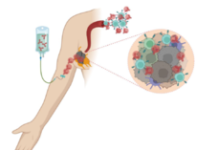Encouraging overall response rate (ORR) to a combination of PD1, BRAF and MEK inhibitors was shown in patients with BRAF V600E-mutated colorectal cancer with translational analyses suggesting that induction of tumour-intrinsic and immune programmes contributes to improved outcomes via MAPK inhibition. The results from a proof-of-concept single-arm phase II clinical study of combined PD1, BRAF and MEK inhibition with sparatlizumab, dabrafenib and trametinib in patients with BRAF V600E-mutated colorectal cancer are published by Dr. Ryan B. Corcoran of the Massachusetts General Hospital Cancer Center and Harvard Medical School in Boston, MA, US and colleagues on 26 January 2023 in the Nature Medicine. This is one of the first clinical trials to incorporate systematic single-cell RNA sequencing (scRNAseq) analysis of paired pre- and on-treatment tumour biopsies. The study findings warrant further clinical evaluation of optimised targeted and immune combinations in colorectal cancer.
BRAF V600E mutations occur in approximately 10% of colorectal cancers, driving constitutive activation of MAPK signalling. Patients with BRAF V600E-mutated colorectal cancer have unfavourable prognosis and respond poorly to standard treatments, with a median overall survival (OS) half that of BRAF wild-type colorectal cancer. While BRAF inhibitors are highly effective in BRAF V600E-mutated melanoma with approximately 60–80% response rate, the RR with BRAF inhibitor monotherapy in BRAF V600E-mutated colorectal cancer is only 0–5%.
Robust adaptive feedback networks were identified in colorectal cancer that leads to rapid reactivation of MAPK signalling following BRAF inhibition, including EGFR, which acts as the dominant driver in many cases. Recently, the US Food and Drug Administration (FDA) approved the combination of the encorafenib, BRAF inhibitor plus cetuximab, the anti-EGFR antibody in BRAF V600E-mutated colorectal cancer. However, confirmed ORR to this regimen is only 20% and clinical benefit is not durable, with a median progression-free survival (PFS) of only 4.3 months. Thus, new effective treatments are needed.
Colorectal cancer has generally responded poorly to immune checkpoint blockade, except approximately 4% of metastatic colorectal cancer with microsatellite instability (MSI)/mismatch repair deficiency, in which RR is nearly 40%, likely due to increased neoantigen load. In metastatic microsatellite stable (MSS) colorectal cancer, RR is near 0%. The approaches to increase the immune responsiveness of MSS colorectal cancer represent a key unmet clinical need.
The authors wrote in the study background that approximately 15–20% of BRAF V600E-mutated metastatic colorectal cancer harbours MSI, and these patients also showed better and more durable responses to BRAF/MAPK pathway inhibition than patients with MSS tumours in prior clinical studies with BRAF/MEK/EGFR inhibition, despite receiving targeted BRAF-directed therapy only. Preclinical models suggest that combining MAPK inhibition and immune checkpoint blockade could enhance antitumour efficacy in BRAF– and KRAS-mutated cancers. A definitive mechanism for this potential cooperativity has not been established.
The study team investigated the potential cooperativity of BRAF/MAPK pathway inhibition and immune checkpoint blockade in BRAF V600E-mutated colorectal cancer. They studied paired biopsies from previous clinical trials of patients with BRAF V600E-mutated colorectal cancer treated with BRAF targeted combinations and preclinical immune-competent mouse models of BRAF V600E-mutated colorectal cancer. They also performed the first clinical study of BRAF targeted therapy combined with immune checkpoint blockade specifically in patients with BRAF V600E-mutated colorectal cancer, evaluating the efficacy of combined BRAF, MEK and PD1 inhibition. All patients underwent paired pre-treatment and day 15 on-treatment tumour biopsies, which were evaluated by scRNAseq to elucidate potential mechanisms of cooperativity.
A single-arm phase II clinical study of combined sparatlizumab, dabrafenib and trametinib was performed in 37 patients with BRAF V600E-mutated colorectal cancer. The primary endpoint was ORR, and the secondary endpoints were PFS, disease control rate, duration of response and OS. The study met its primary endpoint with a confirmed RR of 24.3% in all patients, 25% in patients with MSS colorectal cancer and durability that were favourable relative to historical controls of BRAF targeted combinations alone.
scRNAseq of 23 paired pre-treatment and day 15 on-treatment tumour biopsies revealed greater induction of tumour cell-intrinsic immune programmes and more complete MAPK inhibition in patients with better clinical outcome. Immune programme induction in matched patient-derived organoids correlated with the degree of MAPK inhibition.
The authors commented that even in patients with MSS BRAF V600E-mutated colorectal cancer, in whom a negligible RR to immune checkpoint blockade is expected, the combination of PD1, BRAF and MEK inhibition yielded more than a threefold increase in confirmed ORR relative to historical controls of combined BRAF/MEK alone in patients without prior BRAF inhibition. This also compares favourably with confirmed ORR of encorafenib plus cetuximab for BRAF V600E-mutated colorectal cancer. The study team also observed evidence of increased durability with a median PFS of 5 months versus 3.5 months with BRAF/MEK alone, with 57% of patients remaining on treatment for more than 6 months and 18% for longer than 1 year.
The primary focus of the study was efficacy in population of MSS BRAF V600E-mutated colorectal cancer since these patients have a near-zero response to immune checkpoint blockade and the greatest clinical need. However, eight slots were reserved for patients with MSI BRAF V600E-mutated colorectal cancer to assess whether combined BRAF pathway targeting might enhance the basal responsiveness of MSI tumours to immune checkpoint blockade. While durable responses were observed in two of five patients with MSI enroled, this 40% ORR does not suggest clear evidence of enhanced clinical benefit, and enrolment to remaining MSI slots is ongoing.
A large phase III study of cobimetinib, MEK inhibitor and atezolizumab, PD-L1 inhibitor in colorectal cancer failed to achieve its primary endpoint with posing a doubt on whether MAPK pathway inhibition in general has the potential to enhance the immune response. However, this study was performed in all colorectal cancer genotypes, including colorectal cancer without MAPK-activating mutations, and data suggest that MEK inhibitors alone fail to maintain MAPK inhibition in colorectal cancer due to adaptive feedback.
Preclinical data support that induction of similar immune gene programmes can be found in mouse models of KRAS G12C-mutated colorectal cancer treated with KRAS G12C inhibitor. According to the authors, it is possible that the mechanism of immune cooperativity proposed in this study may be more broadly applicable to other effective RAS/BRAF/MAPK pathway inhibitors, and further studies to evaluate this possibility will be important.
This work was supported by the US NIH/NCI Gastrointestinal Cancer SPORE, the NIH/NCI Moonshot DRSN, NIH/NCI R01 CA208756, Stand Up to Cancer Colorectal Dream Team Translational Research, and the Arthur, Sandra, and Sarah Irving Fund for Gastrointestinal Immuno-Oncology. Partial clinical trial funding was provided by Novartis.
Reference
Tian J, Chen JH, Chao SX, et al. Combined PD-1, BRAF and MEK inhibition in BRAFV600E colorectal cancer: a phase 2 trial. Nature Medicine; Published online 26 January 2023. DOI: https://doi.org/10.1038/s41591-022-02181-8







